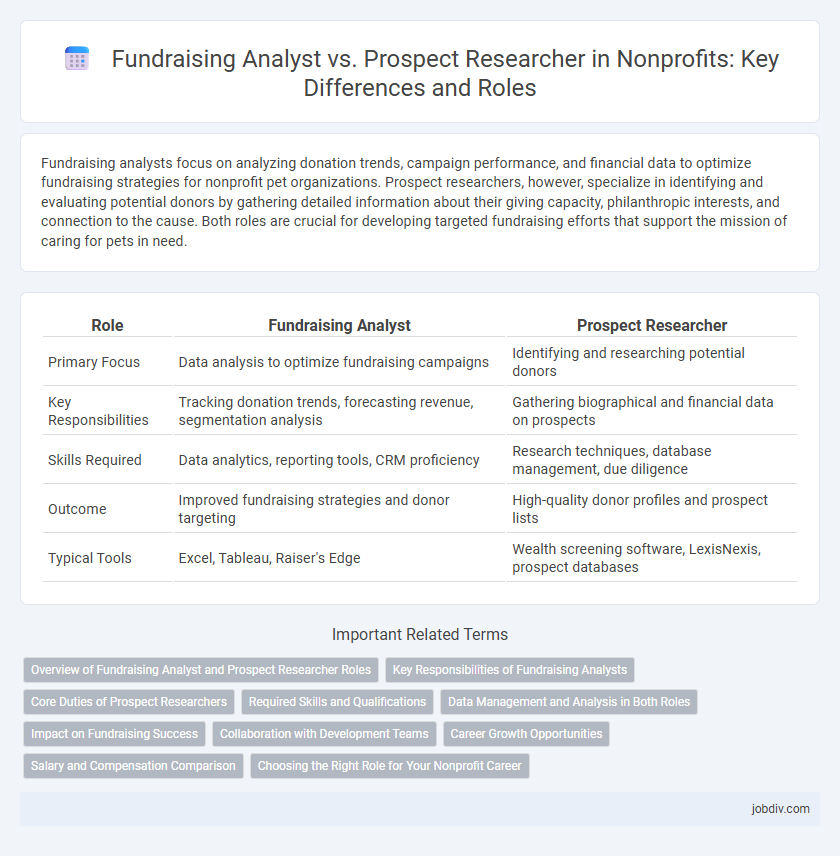Fundraising analysts focus on analyzing donation trends, campaign performance, and financial data to optimize fundraising strategies for nonprofit pet organizations. Prospect researchers, however, specialize in identifying and evaluating potential donors by gathering detailed information about their giving capacity, philanthropic interests, and connection to the cause. Both roles are crucial for developing targeted fundraising efforts that support the mission of caring for pets in need.
Table of Comparison
| Role | Fundraising Analyst | Prospect Researcher |
|---|---|---|
| Primary Focus | Data analysis to optimize fundraising campaigns | Identifying and researching potential donors |
| Key Responsibilities | Tracking donation trends, forecasting revenue, segmentation analysis | Gathering biographical and financial data on prospects |
| Skills Required | Data analytics, reporting tools, CRM proficiency | Research techniques, database management, due diligence |
| Outcome | Improved fundraising strategies and donor targeting | High-quality donor profiles and prospect lists |
| Typical Tools | Excel, Tableau, Raiser's Edge | Wealth screening software, LexisNexis, prospect databases |
Overview of Fundraising Analyst and Prospect Researcher Roles
A Fundraising Analyst specializes in data-driven evaluation of donation trends, donor segmentation, and campaign performance to optimize nonprofit fundraising strategies. In contrast, a Prospect Researcher focuses on identifying and profiling potential major donors through detailed background research, wealth screening, and affiliation analysis. Both roles support development teams by providing essential insights, yet the Fundraising Analyst emphasizes data analytics while the Prospect Researcher concentrates on donor qualification and cultivation.
Key Responsibilities of Fundraising Analysts
Fundraising Analysts specialize in evaluating donor data, tracking fundraising metrics, and generating reports to optimize campaign performance and increase donation revenue. Their key responsibilities include analyzing donor behavior patterns, identifying high-potential prospects, and providing actionable insights to guide development strategies. These analysts collaborate closely with fundraising teams to ensure data-driven decision making and enhance overall nonprofit fundraising effectiveness.
Core Duties of Prospect Researchers
Prospect Researchers specialize in identifying and evaluating potential donors by analyzing wealth indicators, philanthropic history, and engagement patterns to prioritize high-value prospects. Their core duties include conducting in-depth data mining, preparing detailed profiles, and generating actionable insights for development teams to tailor fundraising strategies effectively. This role supports nonprofits by enabling precise targeting and maximizing donor cultivation efforts through evidence-based prospect identification.
Required Skills and Qualifications
Fundraising Analysts require strong data analysis skills, proficiency in CRM software, and expertise in financial modeling to interpret donor metrics and optimize fundraising strategies. Prospect Researchers need excellent investigative abilities, knowledge of wealth screening tools, and experience in gathering and verifying donor information to identify high-potential funding sources. Both roles demand strong communication skills and a deep understanding of nonprofit fundraising dynamics, but Fundraising Analysts focus more on quantitative data, while Prospect Researchers emphasize qualitative donor insights.
Data Management and Analysis in Both Roles
Fundraising Analysts and Prospect Researchers both play critical roles in nonprofit data management and analysis, focusing on maximizing donor engagement and revenue potential. Fundraising Analysts specialize in interpreting donor data trends, campaign performance metrics, and financial reports to guide strategic decision-making and optimize fundraising efforts. Prospect Researchers concentrate on collecting and analyzing detailed donor profiles, wealth indicators, and philanthropic histories to identify high-potential supporters and inform targeted outreach strategies.
Impact on Fundraising Success
Fundraising analysts leverage data analytics to identify trends, optimize campaigns, and forecast donation patterns, significantly enhancing strategic decision-making and resource allocation. Prospect researchers provide in-depth profiles on potential donors, uncovering wealth indicators and philanthropic interests that enable personalized engagement and higher conversion rates. Both roles critically impact fundraising success by combining data-driven insights with targeted donor strategies to maximize gift potential and campaign effectiveness.
Collaboration with Development Teams
A Fundraising Analyst collaborates with development teams by providing data-driven insights and performance metrics to optimize fundraising strategies, ensuring targeted donor engagement and improved campaign outcomes. In contrast, a Prospect Researcher supports development efforts through in-depth research, identifying potential major donors and assessing their giving capacity and philanthropic interests for personalized outreach. Both roles require close communication with development teams to align research findings and analytical data with fundraising goals, enhancing donor cultivation and retention efforts.
Career Growth Opportunities
Fundraising analysts gain career growth by leveraging data analytics to optimize donor engagement strategies and improve campaign performance metrics, making them essential in strategic decision-making roles within nonprofits. Prospect researchers advance by identifying high-potential donors through in-depth data mining and relationship mapping, which opens pathways to senior development positions or leadership in donor relations. Both roles offer strong upward mobility, with fundraising analysts focusing on data-driven strategy and prospect researchers specializing in donor intelligence, creating complementary career trajectories in nonprofit fundraising.
Salary and Compensation Comparison
Fundraising analysts typically earn an average salary ranging from $50,000 to $75,000 annually, while prospect researchers' salaries range from $45,000 to $70,000 depending on experience and region. Compensation packages for both roles often include bonuses and benefits, with fundraising analysts more likely to receive performance-based incentives due to their direct impact on campaign success. Salary disparities reflect the distinct responsibilities, where fundraising analysts focus on data-driven fundraising strategies and prospect researchers specialize in donor identification and qualification.
Choosing the Right Role for Your Nonprofit Career
Fundraising analysts and prospect researchers play distinct but complementary roles in nonprofit development by leveraging data to drive donor engagement and secure funding. Fundraising analysts focus on evaluating campaign performance and donor trends using metrics and predictive models, while prospect researchers identify and profile potential major donors, foundations, and grant opportunities to inform strategic outreach. Selecting the right role depends on your strengths in data analysis or research skills, as well as your passion for direct donor cultivation versus behind-the-scenes preparation.
Fundraising Analyst vs Prospect Researcher Infographic

 jobdiv.com
jobdiv.com